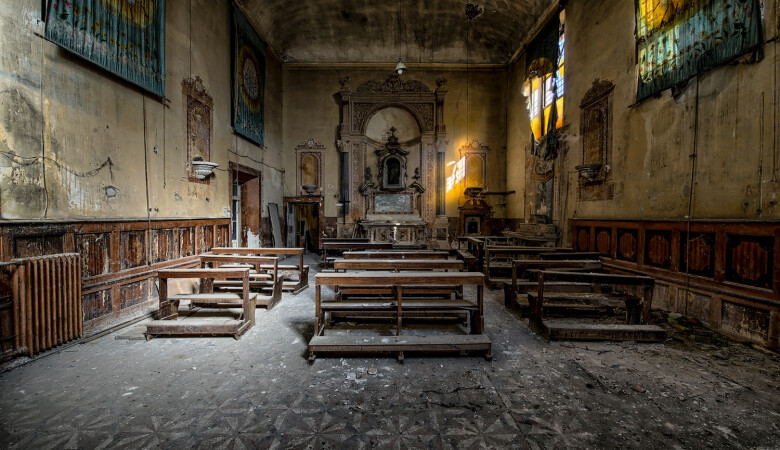On Lawsuits: Better to be Wronged than to be a Bad Witness (1 Corinthians Sermon 19)
February 24, 2019 | Andy Davis
1 Corinthians 6:1-11
Brotherly Love, Money and Possessions, Gospel and Culture
The Most Powerful Weapon: A Healthy Local Church
I'd like to ask that you turn in your Bibles to 1st Corinthians 6, we're looking this morning at Verses 1-11. And as we do that, I want to present again to you my conviction that the most powerful weapon in the hand of Almighty God for the spread of the Gospel of Jesus Christ is a healthy local church. Is a powerful thing in the hands of God, a community of believers that have covenanted together to follow Christ, have made that baptismal commitment that we heard Julia just make a moment ago, that we're going to follow Christ, by the power of the Spirit, we've received forgiveness of sins and that we're in a family, we're not alone, we're brothers and sisters. And it's a beautiful thing to be part of the family of God and that we can present holiness and love and the word of God in a very compelling way to a world that needs it so much, the world is watching all the time. And so the most powerful weapon... And I use weapon language because it is a violent advance we're talking about here. The kingdom of heaven is taking enemy territory from Satan and his demons. It's a different kind of warfare, it's a spiritual warfare and this weapon is the most powerful thing in the hands of God, a healthy local church.
That includes even a great mission agency like the International Mission Board of the Southern Baptist Convention. The mission agency is a good thing, but what that mission agency seeks to do all over the world, is to win individuals to faith in Christ and then settle them in healthy local churches. They're to be taught to obey everything Christ has commanded, and that's in the context of a healthy church, and that's where 1 Corinthians is so powerful for us because it seems that Corinthian church was not a healthy local church. Are you getting that sense? Chapter after chapter of dysfunction. And I think the thing that's so powerful for me, as a pastor, is to realize there are no perfect churches. Churches can be healthy, but there are no perfect churches. And the kind of issues that the Corinthians were facing we face, they're still with us today. The corruption of the human heart is essentially the same and the call of God towards holiness is the same and we need this timeless wisdom. We can't say, "Look, that was 20 centuries ago, we don't deal with those kinds of things anymore." Oh, we really do.
I. The Facts of the Case: Fraud and a Lawsuit
And so, we come to a kind of an interesting point in 1st Corinthians on lawsuits among believers. You're like, "Okay that's what we're doing today?" Yes, we're talking about lawsuits among believers, taking one another to court. It's a very practical thing. And you're saying, "Was that actually going on in the Corinthian church?" Well, it was. And as Paul answers it and addresses it, he addressed it in a timeless sort of way to help us to see the responsibility that we Christians have toward the watching pagan world, the unbelieving world that's watching us all the time. So, let's look at this Corinthian church, this hugely messed up local church with all kinds of dysfunctionality. Apparently what happened here, what are the facts of the case, it seems to me that one brother, we'll call him Brother B, had defrauded another, call him Brother A, in business. He had a swindled him in some way, taking advantage of him. To deal with this, Brother A, the cheated Brother, took Brother B to court in front of the Corinthian pagans, the authorities. Took him to court to get his money back.
So, you can imagine the scene, Brother A, Brother B standing before some non-Christian Roman official to have this case argued so that Brother A could get his money back from Brother B. This was horrible, according to the Apostle Paul. Scandalous, shameful. The Christian church was out there airing their dirty laundry in front of everybody to be seen, the very people they're going to try to witness to next week. Now they've got to deal with this court trial.
II. The Shame of the Lawsuit: The Pagan World is Watching
It's a shameful thing. Paul's tone here is very strong, he's aghast, he's horrified. He uses the shame language, look at verse 5. He says, "I say this to your shame." The issue was that they're witness to a lost and dying world, there in Corinth. And so, there are layers of shame here. Not just one, not one simple shameful thing, but there are layers of shame.
Shame #1: Completely Defeated by Even Having Lawsuits at All
Shame layer number one is in verse 7 Paul says they are completely defeated by even having lawsuits at all. Look at verse 7, "The very fact that you have lawsuits among you, means you have been completely defeated already. Why not rather be wronged? Why not rather be cheated?" Rather than go to court. That's what Paul is saying. That's shame level number one.
Shame #2: That Someone Who Was Claiming to Be a Christian Would Defraud another Brother in Christ
Shame level number two is that an individual in their church, someone who is claiming to be a Christian, could actually defraud another brother for money, that's shameful. Look at Verse 8, "Instead, you yourselves cheat and do wrong and you do this to your brothers."
Shame #3: That They Would Expose Their Dirty Laundry to the Lost People They Were Supposed to be Winning
Shame level number three is that they would expose their dirty laundry to the lost people that they are supposed to be winning to Christ. They would go out in public with this, look at verse 6, "but instead, one brother goes to law against another and this in front of unbelievers."
Shame #4: There Was No One Wise Enough in the Church to Settle This Temporal Matter
And then, Shame level number four is that there's no one, it seems, wise enough in your church to handle a temporal case like this. That's where he actually used the word shame, look at verse five, "I say this to shame you." "Is it possible that there is nobody among you wise enough to judge a dispute between believers?" So, this is what's going on, this is the mess. Paul has to bring light into this darkness. He's seeking to bring health to the disease of this local church.
III. The Christ’s Laws of Loving Witness
Now, for us, we have to just step aside from this and look big picture at Christ's message and his laws of loving witness that I think are relevant to this case and this issue of lawsuits among believers. Let's start with the basic permission, it seems, that Jesus gives to the unbelieving world, the watching world, to judge us by whether we love one another. Jesus said this in John 13:35, "By this will all people know that you are my disciples, if you love one another." So, to some degree, you're saying outside world, watching world, if you want to know if you're dealing with my disciples, watch and see if they love one another, that's how you'll know. John 13:35.
As Paul will later say in this very epistle, 1 Corinthians, 13, famous love chapter. He says, "Love is patient, love is kind, it doesn't envy, it doesn't boast, it's not easily angered, it keeps no record of wrongs." So all of that is what love means here. How does that line up with a lawsuit? Also, Jesus said, "You are the light of the world." We talk about this, it seems, regularly in 1 Corinthians. This is continually on Paul's mind, what Jesus said in the Sermon of the Mount, Matthew Chapter 5, "You are the light of the world. A city on a hill cannot be hidden, neither do people light a lamp and put it under a bowl. Instead, they put it on its stand and it gives light to everyone in the house. In the same way, let your light shine before others, that they may see your good deeds and glorify your Father in heaven." That's a really powerful expression, isn't it? By watching your good deeds, it seems Jesus is saying they'll end up in Heaven glorifying the father. That's incredible. So that's part of the evangelistic package is your good behavior. It's the context for the Gospel words that we preach.
We also have the parable that Jesus gave us of the 10,000 talents, a parable about forgiveness. You remember how Peter initiated that conversation? "Lord how many times shall I forgive my brother when he sins against me? Up to seven times?" Thinking he was being generous. And Jesus said, "I tell you not seven times, but seventy times seven times." 490, don't do the math. And don't count, don't keep that list, remember? You're up to 146, hope you know. You're running out of coupons. That's not what he's saying, he's saying there's just limitless forgiveness.
The Parable of the Ten Thousand Talents
And then he told the Parable of the 10,000 talents. You remember the king wanted to settle accounts with his servants, and there was found a man who owed him 10,000 talents, an incalculable sum. A talent, 75 pounds of a precious metal. So, in today's value it'd be billions of dollars. And it was gone, he had squandered it. Staggering. And since the man was unable to pay, the king ordered that he be sold into slavery, he and his wife and all that he had be sold to repay the debt. Impossible, but he'd be in prison forever. And the man fell on his knees before the king and said, "Be patient with me and I will pay back everything." But the king, in mercy, cancelled all of that debt and let him go, but then that man went out and found one of his fellow servants who owed him 100 denarii, which is 100 days wages for a day labor, so that's a considerable sum, probably $15,000-20,000 in our amount, but far less than 10,000 talents. And he grabbed him and began to choke him, "Pay back what you owe me." He was unable to pay, and so he begged for forgiveness, but he refused. Instead he went off and had the man thrown in prison till he should pay the debt. When the other servants saw what had happened, they were obviously distressed. Went back and told the king, and the king hauled that man back in and said, "You wicked servant. I cancelled all that debt of yours because you begged me to. Shouldn't you have had mercy on your fellow servant just as I had on you?" And in anger, in anger the king handed him over to the jailers to be tortured until he should pay back his debt, the 10,000 talents. And Jesus summed it all up saying, "That is how my Heavenly Father will treat each of you if you do not forgive your brother from your heart." It's very powerful. It's maybe one of Jesus most powerful parables.
Jesus also told us in Matthew chapter 5, that we disciples should turn the other cheek. When we're dealing with others, with enemies who would attack us and hurt us, he gives us a whole different ethic. Matthew 5, "You have heard that it was said, eye for eye and tooth for tooth, but I tell you, do not resist an evil person. If someone strikes you on the right cheek, turn to him the other also." Listen to this, in light of the lawsuits issue. "And if someone wants to sue you and take your cloak, let him have your tunic as well." In other words, Jesus would almost say, settle out of court and give him what he wants and more besides. Interesting.
"And if someone forces you to go one mile, go with him two miles. Give to the one who asks you and do not turn away from the one who wants to borrow from you. You have heard that it was said: 'Love your neighbor and hate your enemy.' But I tell you, love your enemies and pray for those who persecute you, that you may be sons of your Father in Heaven. He causes his sun to rise on the evil and the good, sends rain on the righteous and the unrighteous. If you love those who love you, what reward will you get? Are not even the tax collectors doing that? Be perfect, therefore, as your heavenly Father is perfect."
Sermon on the Mount. So these clear teachings are part of Christianity. Turn the other cheek. Someone sues you, give them what they're demanding, give them more than they're demanding. Don't resist them, don't defend yourself. Then Paul gives us a similar teaching in Romans, Chapter 12, dealing with enemies, dealing with outsiders, dealing with people who hate us. "Do not take revenge, my friends, but leave room for the wrath of God for it is written, 'It is mine to avenge, I will repay.' On the contrary, if your enemy is hungry, feed him. If he is thirsty, give him something to drink. In so doing you will heap burning coals on his head. Do not be overcome by evil, but overcome evil with good."
Well, all of that, the most recent verses I've been giving you, have to do with dealing with outsiders, enemies, persecutors. I would say it's a how much more ethic in terms of with brothers and sisters within the church, how much more would we seek to be gracious? How much more would we seek to be kind and loving to them?
The Beautiful Ethics of the Early Jerusalem Church
Now, the early church seemed to have drunk in all of Christ beautiful teachings of this ethical life together and they lived it. After the day of Pentecost, when they heard the message of the Gospel, 3,000 were added to the church that day and their life together is described incredibly at the end of Acts 2:44-45. It says, "All the believers are together and had everything in common. Selling their possessions and goods they gave to anyone as he had need." That's the loving, cohesive community that was there after the day of Pentecost. How does suing a brother and recovering your loss line up with that? It doesn't.
And then, again, in Chapter 4, we have the church's sacrificial attitude, Acts 4:32-33, and it shows how their loving attitude toward one another was the power for their evangelism. Their evangelistic fruit came from this healthy covenantal life of a local church together. Listen to Acts 4:32-33, "All the believers were one in heart and mind, no one claimed that any of his possessions was his own, but they shared everything they had. With great power the Apostles continued to testify to the resurrection of the Lord Jesus and much grace was upon them all."
Now, the Corinthians, it seems, at least one of these brothers, had turned away from this lifestyle entirely, took a brother to court and tried to recover his lost revenue. It seems the Corinthians misunderstood their lives in this world. We are aliens and strangers, and all that we have in this world is a temporary gift of God, it's useful for the advance of the Gospel, we can't take any of it with us. It's just a tool down here to seek to win the loss and sustain the people of God.
IV. The Future Revealed: The Saints Will Judge the World and Angels
Not only did the Corinthians misunderstand their lives in this world, they misunderstand our exalted, misunderstood our exalted future in the next world. Verses 2-3 gives us a glimpse into the future that we would have no other way, it's interesting. Look at verses 2-3, "Do you do not know that the saints will judge the world? And if you were to judge the world, are you not competent to judge trivial cases?" Verse 3, "Do you not know that we will judge angels? How much more the things of this life?" This is a remarkable revelation about the future. Christianity is a revealed religion. It teaches us things that are going to happen in the future and this gives us incredible insights about the role we're going to play in the future world that Christ will establish. And the logic here is given our exalted role in the future world, we should be able to handle mundane earthly things. It's a how much more argument here. We should be able to handle little things in the church.
Bombshell #1: The Saints Will Judge the World
So he drops a couple of bomb shells here. It's really quite interesting. Like bomb shell number one, "The saints will judge the world." Wow. Now, this could refer to some role Christians will have together with Christ in condemning the unbelieving world to their just fade on Judgment Day... Possibly. The entire anti-God system, that we read about in the book of Revelation. The anti-Christ system will come crashing down in judgment and the saints will have a role in that final justice. So the entire thing will be reversed from what was going on in Corinth, the wicked will stand before the righteous. In that case seems to be the logic here, then why would the saints voluntarily reverse it and stand before the wicked to receive verdict? It could refer to what follows Judgment Day, so the saints will play a role in the eternal kingdom, ruling and reigning with Christ, judging with him, like Revelation 3:21 says, "To him who overcomes, I'll give the right to sit with Me on My throne, just as I overcame and sat down with my father in his throne." So, there's a sense of ruling with Christ.
Bombshell #1: The Saints Will Judge Angels
Bomb shell number two is that the saints will judge angels. How can this be? This is amazing, some commentators wonder is this referring only to the devil and his fallen angels, demons. Romans 16:20 says, "The God of peace will soon crush Satan under your feet." So, we'll get to have a role with Christ in pulling the trigger on sending them to the lake of fire. That's how some commentators answer. Others think it refers to all angels, Holy Angels. Doesn't say demons here, but holy angels. So, that will, in some sense, no longer made a little lower than the angels, but in a resurrected glorified state, above the angels and ruling over them in some sense. I don't know. When I don't know, I say I don't know. But I do know how Paul's using all this and he's arguing, as I said a moment ago, if that's our future, how much more should we handle the present? That's how he's arguing.
V. The Remedy Commanded: Humble Mediation Within the Church
So the remedy is humble mediation within the church, appoint wise individuals within the church to mediate.
Therefore, if you have disputes against such matters, appoint as judges even men of little account within the church. That's one possible translation. But then in verse five, he says, "I say this to shame you. Is it possible that there's nobody among you wise enough to judge a dispute between believers?" So this is just like the advice Jethro, Moses' father in law gave to him. Don't sit on every case, appoint wise individuals who can judge lesser cases under you and handle all of that. And so that's basically the role. Get individuals who are wise, discerning, Godly men, and they can handle these kind of disputes in-house. We don't take it in front of the pagans to deal with it.
That's the logic that he's giving here. Verse 4 is notoriously difficult to translate. There are a lot of different... The NIV is going to read a little bit differently. The ESV it's going to read differently than KJV. It's a hard verse. ESV gives us, "If you have such cases, why do you lay them before those who have no standing in the church?" As though those people, the people of little repute are the outsiders. Why would you go to them? That's the ESV approach. NIV gives the idea that you could choose even the most humble believer, somebody with no reputation within the church and they could do the job. Difficult to know which way to go, but the point is clear, appoint Godly men and handle it in-house, mediate it in-house and don't go to the pagans.
Now, above all of this, is renew your commitment to the Christian principles that we've talked about a few minutes ago. Remember that we'll be known as Christ disciples if we love one another, that's far more important than who's right or wrong, who wins the arbitration case. Genuine reconciliation between brother A and brother B, that's what we need here. Not who wins the case, who is proved right or wrong, or who gets the money. Far more important is, do you love one another? Have you forgiven one another? Far more important? The deepest attitude here is a powerful kind of transferable principle here that Paul gives in verse 7. The very fact that you have lawsuits among you, means you've been completely defeated already. Listen to these words, "Why not rather be wronged?"
It's hard for me to overstate how powerful that verse can... What a powerful impact that verse can have on your marriage, your family life, your church life, your work life, Why not rather be wronged? It's just another way of saying, turn the other cheek. Don't seek your own vindication, leave it to God. Allow yourself to be wrong. Don't retaliate, don't argue back, don't answer back, allow yourself to be misunderstood. Why not rather be wrong rather than be a bad witness to the outside world? Alright. So for most of this, I think, most of the verses I've been walking through, I think Paul has turned his guns on Brother A, the plaintiff, the one who initiated the lawsuit. But now he turns and gives his attention, I think, to Brother B, the one who defrauded or swindled his brother. Look at Verse 8. "Instead, you yourselves cheat and do wrong and you do this to your brothers."
VI. The Serious Warning: The Wicked Will Not Inherit the Kingdom
And then he brings in Verses 9-11, in context, I think Verses 9-11, which is a remarkable sin list and has great import for our ministry in this day. And we're going to talk about it much more fully next week, but I just want you to see it in context here with the lawsuits and Brother A, Brother B. There's a deeper warning he's given to Brother B, the one who committed... It seems he committed the crime of defrauding his brother. And look what he says, Verse 9-11. "Do you not know that the wicked will not inherit the kingdom of God? Do not be deceived. Neither the sexually immoral, nor idolaters, nor adulterers, nor male prostitutes or homosexual offenders, nor thieves, nor the greedy, nor drunkards, nor slanderers. What's the next one, nor swindlers, the last one on the list, will inherit the Kingdom of God, and very famously the statement, such were some of you."
That's what you used to be, "but you were washed, you were sanctified, you were justified in the name of the Lord Jesus Christ and by the Spirit of our God." So, you swindler I'm worried about your soul, I'm worried about whether you're actually what you say you are, a Christian. I'm very concerned about that. You may win the case, you may get away with it, but God sees everything and I'm very concerned that you will not look good on judgment day, and that is far more important than any money that would pass between the two of you. What is going on in your soul? That's how Verses 9-11 functions in the flow of the chapter.
Now, for us in our day and age, with such questions about homosexuality and other issues, it is worthwhile for us to go back over it, and we will next week Verses 9-11, and especially the incredible impactful statement, "Such were some of you." So I want to unfold all of that next week. But I had Verse 9-11 read this time because I think it completes Paul's argument with Brother A and Brother B. Paul's basically saying to the swindler, "I fear for your soul, I fear for your soul."
VII. Applications
Alright, so that's the text. Walk through it. Now, how do we apply it? How do we apply it? I said to some of the guys this week, I said, "I feel like I'm carrying eight cans of worms up here to the pulpit with a can opener." [laughter] And which can will I open? I'm not even going to name the cans, I've got a list in my head of what the cans are. But just to name them, I'm starting to open them and they'll start crawling all over the pulpit. What about this, what about that, what about the ethics of the other? And on and on it goes. And I got to tell you, I don't know, I don't know all the ethical implications of this. I'm safest to stick to home-base which is don't sue another brother in Christ.
One thing I do want to say given our present setting, before we even get into my attempt at applying this. Many of you are aware of what's happened in the Southern Baptist Conventional last couple of weeks in terms of sexual predators that were in some way protected by Southern Baptist churches and never brought to justice. I don't think this text gives any right for a church not to hand over such a criminal to the authorities. The elders of our church, we are absolutely committed to the protection of our children. We discussed this at length on Monday and ways we can take steps. Many things are already in place in terms of background checks and things like that. So this passage does not give a cloak of secrecy by which sexual predators, behind which they can hide. I'm not saying that doesn't happen. Crime gets committed, they should be handed over to the authorities and there's a lot more I could say about that. That itself is its own can of worms, but I wanted to say that.
Alright, so what question is in front of us? Can Christians ever go to court at all? And if so, when and how and for what? I don't believe this passage rules out all involvement of Christians in lawsuits. Paul himself regularly was in court. And he actually used the court's mechanisms and appeal process for his own defense and for the spread of the Gospel. "I appealed to Caesar," was a legal thing he could do as a Roman citizen. Paul wrote Romans 13 saying that, we must... All Christians must submit ourselves for the Lord's sake, to the governing authorities because there is no authority except what God has established. Remember in Acts 16 when Paul and Silas were wrongfully without trial, beaten publicly and thrown in the Philippian jail, remember that? And how God sent this amazing surgical strike earthquake, in which all the chains fell off and the prison doors flew open and that's amazing.
As a mechanical engineer, I'm like, "I don't know how that happens." But it happened, it's incredible. The Philippian jail was converted as a result of that. But this prisoners didn't run away. Paul didn't run away. He could have. The next day, the magistrates sent word saying, "Paul and Silas, you can go." Paul's like, "No chance. We were beaten publicly without trial and now you want to kind of get rid of us secretly, no way. Let them come themselves and escort us out." Now, why is he doing that? I think he's carving out religious freedom for the new church that's being planted there in Philippi. And so he's using the legal situation to do that. Now, let's keep it simple ethically here, in terms of application. Don't take another Christian to court. That's just the simple teaching here.
It's not addressing, "Should you defend yourself against non-Christians?" I've read a lot of what we should do with non-Christian type verses. But within the church, do not take another Christian to court. I would have a hard time skirting the clear teaching in this passage. Why not rather be wronged? Why not rather be defrauded? It's very clear. It's better to be defrauded than to take the brother or sister to court. It's better to lose the money. It's better to lose the portion of the business than to litigate and press your rights and win the case, but show no regard for your Christian witness in front of the watching pagan world. That is a bad thing, so don't do it. We should care much more about the souls of the people involved in that process. The law enforcement officials and the district attorney in the courtroom and all of that, we should care about their souls, more than the money we can win back.
The basic rule here in terms of involvement in the court system must be your motive. Why do you want to go? Now if the issue like with Paul and Silas is a matter of principle concerning other people, their rights, their freedoms, and not just your own selfish rights or advantages, it may be necessary to go to court. We could imagine a Christian public defender whose whole life is spent in court defending the poor, the weak, the needy from attacks by the powerful. Such a Christian would spend most of their days in court. You could just as well imagine a Christian district attorney whose whole life is spent prosecuting criminals and upholding Romans 13.
And there maybe many examples of Christians going to court for the benefit of the gospel or for religious freedom. Like the rights we've seen of certain individuals like Christian bakers, to not necessarily have to bake a cake for a gay marriage, something like that. Or the rights of families to publicly or to educate their children and not have to go to the government schools, which many countries in Europe do not have. It's illegal. They have to go to the government schools, but Christians went to court to carve out the freedom to educate, religiously educate their own children. The issue here in 1 Corinthians 6 seems to be carnal. "I was wronged, I want my money back," and a sense of indication. That's I think home base for what not to do.
Central issue then must be our loving witness to a dying world. We are surrounded every day by people who are without hope and without God in the world. They don't have that anchor that I prayed about it, at the beginning of my message here. They're dead in their transgressions and sins, they need hope. We are here to give it to them. Nothing that you would lose in a court trial or something like that is anywhere near as important as that. People are watching us. So let's, as a church, go back over the basic rules that Christ has given us. If an outsider came into our church, a meeting, a home fellowship, Sunday morning worship, would they know that we are Christians because we evidently love each other? Start there.
John 13:35. Are we acting like the lights of the world here in the Raleigh-Durham area? Do people see our good works and glorify God? Will they glorify God in heaven, because they saw how we were living? Having had our infinite sin debt covered, our 10,000 talents, are we living out a life of forgiveness toward people who have sinned against us? Are we characterized by gracious, loving forgiveness toward people who have sinned against us or are we unforgiving and choking the person saying to them, "Pay me what you owe me"? Do we turn the other cheek? Do we give our tonic as well? Do we go the extra mile with people who are trying to hurt us? Do we see our temporal blessings as less important than the souls of the people we're dealing with?
Can we take the words, "Why not rather be wronged?" and see how many hundred different ways we could live them out in the next week? Don't defend yourself, don't argue. Don't try to prove that what you did was the right thing, be humble. How would that affect your marriage, let's say? How would that affect your relationship with your kids or your relationship with your parents? How would it affect your relationship with your neighbors or with co-workers? "Why not rather be wrong? Why not rather be wrong, rather than press your case and win your case? "Why not rather be wronged for the sake of the gospel? Now, as we finish this message, I can't help but just call to any that are here that don't know Christ. Every week I pray that God would bring people who have never heard, who have not yet come to Christ or have not yet yielded.
I think about what God did in Julia's life. And I don't know what stories are unfolding among those of you that are not yet Christians in your life. I don't know what resistance that you have. It may be that you're battling depression. It may be that you have guilty feelings for things that you've done. Do you realize what a great savior Jesus Christ is, how He came to seek and to save lost people like you and me? And there's no sin that we can commit, no manner of sin or blasphemy that the Son of Man, Jesus, cannot forgive. And so I'm calling on you to just look to him with the eyes of faith. Look to him and ask him to be your savior. There is a court trial coming and there's no escape from the judgment of God. He sees everything. We're going to have to give an account for everything we've ever done. Christ is the only one who can vindicate you on that final day and he is a great savior. Come to Christ. Come to Christ. And we would love to hear your story next chance we get, when you stand up in the baptismal area and tell us what happened and how God saved you.
Now we're going to turn in the service now to an observance of the Lord's Supper. I'm going to close this sermon time in prayer and then I'm going to ask the deacons to come and help serve. Let's pray. Father, thank you for the time we've had to walk through 1 Corinthians 6:1-11. Thank You for the power of the word of God. And thank you that your Spirit's been here. Now, we ask for fresh ministry of the Holy Spirit in the ordinance of baptism. Ordinance of the Lord Supper. Thank you, oh Lord, for the Lord Supper. Thank you for communion. Thank you, Lord, that we have the opportunity to do this, and I pray that you would please be with us through the spirit that we would experience it fully and powerfully. In Jesus name. Amen.




























